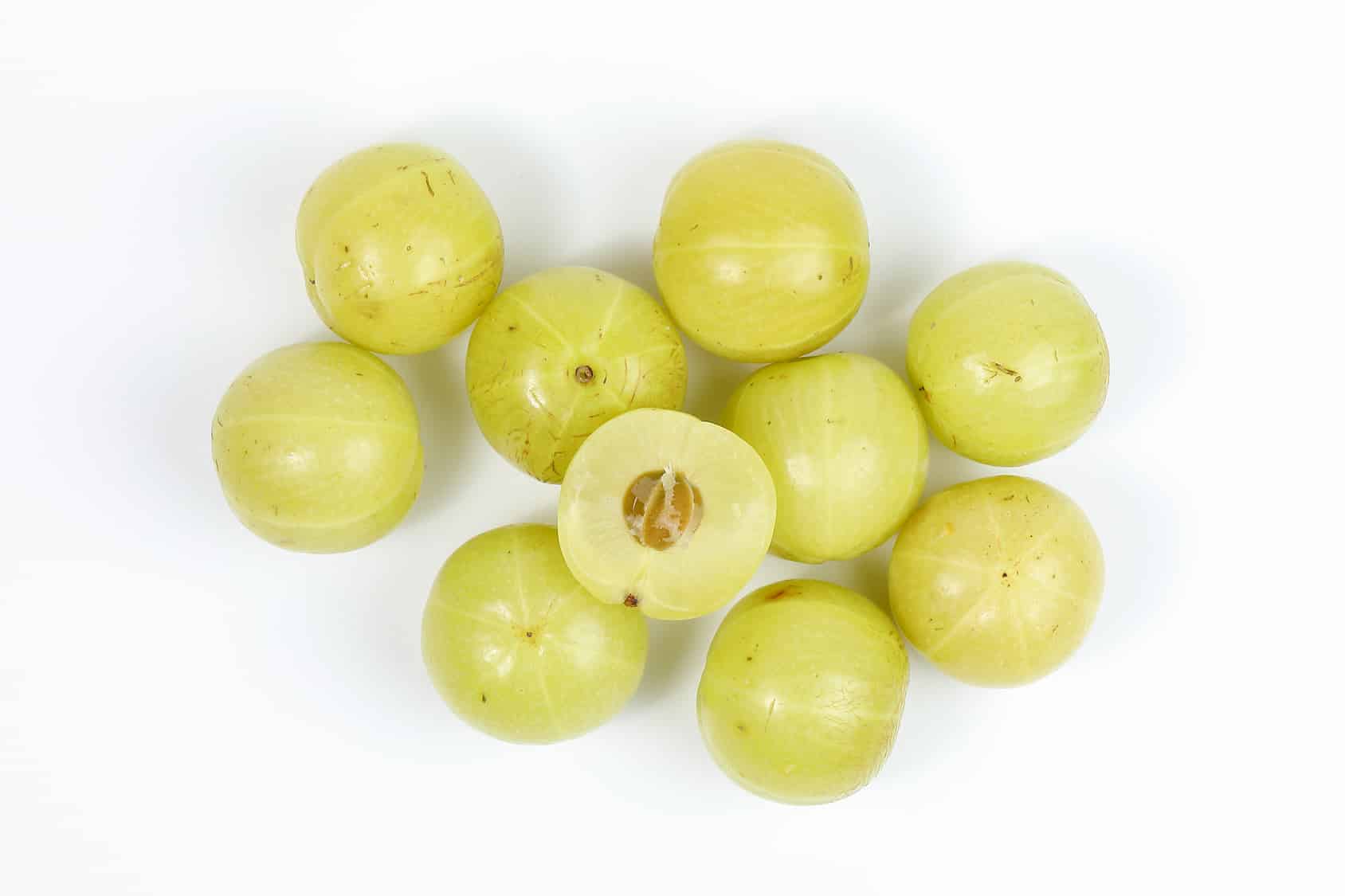Amla Berries

The amla tree, also known as Phyllanthus emblica and Amla officinalis, was originally native only to India, but is now found in many other temperate, tropical, and subtropical regions. The tree belongs to the spurge family and can grow up to 18 meters high. Its fruits, the amla berries, sometimes also called amalaki, ripen in autumn. They are about three to four centimeters in size and have a yellow-green color. The taste is acidic and slightly bitter. To take away the bitter sourness of the berries, in India they are traditionally soaked in salt water flavored with turmeric. Jam made from the fruit is said to be a real delicacy, but the dried berries are also excellent with exotic fruit salad or cooked vegetables.
The “miracle berry“
Amla berries are still traditionally harvested by hand and then dried in the shade. Amla berries are known for their high vitamin C content. Each individual small fruit contains about twenty times more vitamin C than an average orange. In addition, Amla berries contain a lot of chromium, iron, calcium, phosphorus, pectin, beta-carotene, many B vitamins, fatty acids, glucose, fructose, polyphenols, and alkaloids. In nutrition, therefore, they are already considered a “superfood”. The berries are used in numerous Ayurvedic recipes.
Amla berries, also known as Indian gooseberries, have long been valued in Ayurvedic medicine for their health-promoting properties. In classical Ayurveda, they are even considered sacred fruits: the amla tree is said to have once been the first tree of creation. According to Ayurvedic scriptures, a tear of Brahma, the Creator, fell to earth, from which the amla tree grew. The tree is therefore the oldest known Ayurvedic useful and medicinal plant. More exciting information about ayurvedic cosmetics can be found here!
By the way: In India, amla berries are also called “fruits for eternal youth and beauty”, because their valuable ingredients actually have quite amazing effects on our body.
Amla berries help against cough and bronchitis, inflammations and ulcers, headaches and high blood pressure, diseases of the gastrointestinal tract, irregular menstrual bleeding and some other complaints. The high vitamin C content also improves the absorption of iron by the body and also strengthens the immune system.
In addition, amla berries can prevent various diseases. These include dementia and Alzheimer’s disease, heart disease and arteriosclerosis, gallstones, and stomach ulcers. Chromium contained in amla berries even regulates the secretion of insulin, thus lowering blood sugar levels.
Amla extract – active ingredient for skin and hair
In cosmetics, amla berries are often used in the form of extract or oil to take advantage of their skin care and anti-aging properties.
And the berries also have a very positive effect on skin and hair. The antioxidant effect of vitamin C slows cell aging and protects the skin from attacks of cell-destroying free radicals. They also promote the formation of collagen in the skin, which contributes to a skin-firming effect. If amla products are applied externally to the skin, they cool and have an antibacterial, antifungal, and antiviral effect. Not only pimples and blackheads, but also more serious skin diseases such as erysipelas can be effectively treated with products containing Amla. Damaged tissue is repaired in a natural way, scaly skin is effectively smoothed. Anyone who massages hair oil with amla berries into the scalp promotes hair growth. It is better supplied with blood and valuable nutrients.
Amla oil can also be applied to the hair to promote hair growth, strengthen the hair and reduce split ends. It can also help protect hair from harmful environmental factors and give it shine and smoothness. Studies have shown that the fruit inhibits certain enzymes responsible for hair loss, but at the same time boosts specific processes that promote the growth of hair. A double benefit, so to speak. The tannins in amla oil also provide stronger hair and can protect against premature graying due to their pigmentation-enhancing properties.
Individual cosmetic formula development is our strength. We can develop a product with amla extract for your product line and produce it from as little as 5 kg.
Fact Sheet: Amla Extract
INCI: Phyllanthus Emblica Fruit Extract
CAS number: 90028-28-7
Ingredients: high vitamin C content, plus riboflavin, chromium, iron, fatty acids, glucose, fructose, calcium, phosphorus, polyphenols, and alkaloids
Effect: strong antioxidant, antibacterial, antifungal, and antiviral, strengthens the immune system
Fields of application: in capsule and powder form for internal use, externally as a hair shampoo, hair oil and skin cream.
Amla berries – an active ingredient ideal for valuable cosmetics
The green-yellow fruits of the amla tree literally have it all. They contain twenty times more vitamin C than oranges, and in addition to tannins and vitamin B, they also contain the antioxidants carotene, niacin, and polyphenols. Amla oil is therefore no longer considered only in Ayurveda teachings as a completely natural fit and beautifier for skin and hair. Due to the enormously high proportion of antioxidants, the berries can render free radicals harmless, so that they serve as cell protectors for the skin. We would be happy to assist you in developing high-quality formulations with the extract of alma berries. Please contact us today.
Sources:
Phyllanthus emblica L. (amla) branch: A safe and effective ingredient against skin aging.; J Tradit Complement Med. 2021 Feb 9;11(5):390-399.